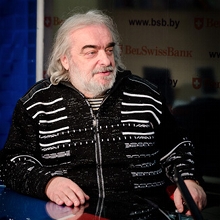Raman Yakauleuski: “Multivector” approach and conspiracy-based diplomacy lead to no good
2- 19.02.2015, 10:45
- 9,904

Lukashenka met with foreign minister of Iran Mohammad Javad Zarif and announced his plans to visit Iran soon.
Belarusian foreign minister Uladzimir Makei was earlier reported to have paid an official visit to Syria.
What interests does official Minsk pursue in Iran and Arab countries?
Political observer Raman Yakauleuski said in an interview with charter97.org that the current activity in foreign policy in the style of “cospiracy-based diplomacy”, when foreign minister Makei and Lukashenka suddenly visit the countries that consider each other hostile, makes the multivector approach dangerous for the national interests of Belarus. Except for a small group of people, none in government or public institutions is aware of the multivector policy. Consequences may be unpredictable for the country.
– The official media report about Minsk's increased cooperation with Iran and Syria. Why did these countries become so necessary for us again?
– I would explain it also with the new president in Iran. He was accepted rather warmly by the West. He is not as repellent as his predecessor and Lukashenka's friend. He is a well-educated graduate of a British university. By the way, he knows Russian among other languages. So, Lukashenka can talk to him without interpreters at the upcoming meeting, as he did recently to Merkel in Minsk. I think this fact is worth noticing.
– What will they talk about, in your opinion?
– Speaking about relations with Iran, Lukashenka emphasised economic interests. According to him, the countries' relations are “at the very high level”. Well, I would use 'were' instead of 'are'.
I'd like to remind you that Iran has Islamic democracy. Whatever one may say, presidents there are replace one another on time in accordance with real election results, which we don't see in, for example, Belarus.
It's not a secret that Lukashenka interests in Iran due to oil. We know that Iran is one of the world's biggest oil producers, but it has problems with processing. I'd like to note that Belarus has modern oil refineries. They are of interest for other countries aside from Russia.
– Is this Lukashenka's plan?
– Sure. The question is only how to deliver oil. When Lukashenka's friend Ahmadinejad was in power, they considered the following variant. Belarus will take part in oil extraction in Iran and will use the produced oil as it wants. As far as I know, Iran agreed to this kind of cooperation. However, as some media reported later, Belarusians were kindly offered the oil deposits situated in minefields from the Iran-Iraq war. Belarus was supposed to clear the minefields before oil extraction. This “hospitality” was among the reasons for a sudden cooling in relations between Minsk and Tehran. Belorusneft company “buried” the project.
– Lukashenka draws parallels between Iran and Belarus, in particular, due to sanctions. Is this comparison fair?
– When we hear that sanctions make the two countries so similar, I'd like to recall that the sanctions against Iran were effective. The were tangible and real, in particular, for Iran's banking sector. It is admitted that the western sanctions had a significant impact on the elections in Iran and the politician, who is regarded as moderate, was elected president. So, it's not quite right to speak about the experience of sanctions, because the Belarusian regime has not experienced real system sanctions. The people of Iran got tired of these sanctions and voted for a new president. To a certain degree, it has made the country hold negotiations – official and unofficial – with Washington. Not all are happy about the new relations between the US and Iran. But this pragmatic approach became possible because Iran began to demonstrate a certain realism in its nuclear programme, the main factor that hindered the country's relations with the West.
It's worth noting that Iran's head is not the president but Supreme Leader Ali Khamenei, who is the guarantor of the current Islamic regime.
– What can you say about Belarus's interests in Syria?
– The first consultations between representatives of Bashar al-Assad (Lukashenka knew even his father) and representatives of Syria's moderate opposition took place in Moscow in late January. When we hear the words of victory and Makei's remarks that Minsk is now regarded as the international platform for such [peace] contacts, meaning the war between Russia and Ukraine, I do not rule out that the owner of the office with a huge globe is thinking about proposing Minsk as a mediator in the Syrian crisis. I would not rule out this probability.
Let me speak about the result of Minsk's “multivector” approach. Assad's main enemy is Turkey. Putin with his gas can afford to be friends with the presidents of Turkey and Syria. But when the Belarusian leadership uses the “multivector” approach and wanders the labyrinth of international politics, one may doubt its common sense. The main question is how much such foreign political maneuvers of Minsk strategists answer the national interests of Belarus.
The US can afford to hold talks with Tehran and cooperate with Saudi Arabia and Qatar, the arch enemies of Shia Iran. But when we hear about Belarus's “multivector” policy, which Makei constantly mentions, it looks, to put it mildly, strange. It is sometimes called pluralism in one head. Let's remember that the Belarusian regime tries to be active not only with Iran and Syria but also with other Iran's foes, for example Qatar.
I have the impression that when they rotate the globe in Lukashenka's office, they have illusions that they hold the whole world in their hands. But this is not so.









